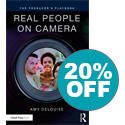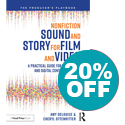
You’ve got to shoot and interview and ask the questions. How do you get the best from your interview subject(s)? How do you prepare? These four steps will improve the process every time.
- Research. I don’t just mean your basic Google search or Wikipedia page look-up. I mean actually reading something your interview subject has written or watching a speech they have given so you can a) learn from it and b) refer to it and build rapport. Also read articles about your person, so you understand where they come from and what they do. Talking to people who know them well–a spouse, assistant, co-worker–can give insights into their style, character and personal history.
- Pre-Interview. Have a phone conversation several weeks in advance of your interview. Weeks not days, because you don’t want someone saying “As I said to you yesterday…” in their answer. I find phone is better than Skype or Google Hangouts, because people are more honest when they can’t see you. If you don’t have the time or ability to pre-interview, then talking to someone who knows this person is even more important. You don’t want to be blindsided by a strong viewpoint, a difficult to understand accent, or some other element that you could easily prepare for in advance.
- Create a Story Arc. Everything is story. Even reality. Find the challenge that your subject had to overcome. This is the high point of the story, and you can work backwards from it as you develop questions to lead up to the main high point. Also think of what might hook in viewers to this story. How can you elicit that bit of the story arc? Then think about how the story ends. What’s a good way to help your subject get to this conclusion?
- Reverse Engineer Your Questions. Reviewing your research notes, your pre-interview notes, and your draft story arc. Then build questions that can elicit those answers and topics. The goal is not to control every moment, but to help support your subject as they reveal their story. people always ask me if I send interview questions in advance. Absolutely not! Send a list of topics, sure. But don’t give away your questions that are designed to elicit a story arc or you will find yourself interviewing someone who has over-prepared. If someone tells you that you MUST send questions, send three or four but write them related to themes. Get into the specifics on site.
Look, we all know that nothing is ever set in stone when you conduct an interview with a “real person” (i.e. not an actor or someone highly media-trained) on camera. Good preparation makes the shooting and editing process go much more smoothly.
This blog post is based on one of the chapters of my new book The Producer’s Playbook: Real People on Camera (Focal/Routledge). Order copies here. For more details on specific interviewing techniques and post-production strategies for working with interviews, see my Lynda.com courses here: Amy’s stuff on Lynda.com




